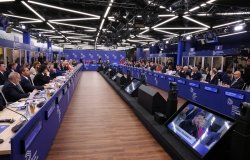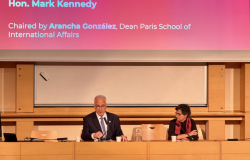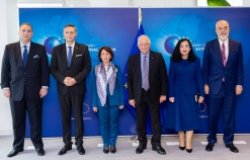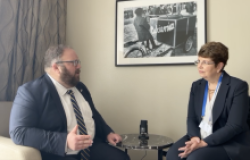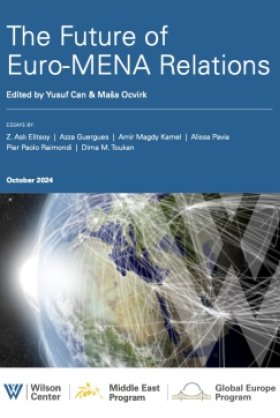Untying the Aegean Knot: Options for Washington
Aug./Sept. 2001 - As the 21st century opens, Greece and Turkey may face the best opportunity in years to settle their outstanding differences. That was not so during most of the 1990s. Experts feared that the end of the Soviet threat, which had overshadowed bilateral differences, would expose their rivalry to more nationalistic tension.
Several events validated that concern. The 1996 Imia/Kardak crisis raised the fear of armed confrontation. Turkish allegations of Greek support for Abdullah Ocalan, the Kurdish terrorist, were amplified by the actions of several Greek officials who spirited him away to Kenya, where he was under the protection of the Greek Embassy.
Today, improvement in Greek-Turkish relations is real. Significant issues remain—boundaries, airspace, exploration of resources in the Aegean, and the status of Cyprus. But a forward momentum remains, and the U.S., its NATO allies, and the European Union should not fail to support the process.
Recent Greek-Turkish relations illustrate how external factors—especially economic and political—cause governments to reassess old issues and entertain new options.
Consider some economic facts. Twenty years after entering the EU, Greece's economy has prospered in relation to its Balkan neighbors, but it remains the bloc's poorest nation, based on per capita income. Turkey's economic picture is worse. Its political stability and economic viability depend on assistance from the IMF negotiated in spring 2001 and on the success of the reform of its financial institutions and policies.
Both Greece and Turkey would benefit from better control of military spending since each spends about 4.5 percent of its GDP on defense, the highest in NATO. Greece could redirect money into social programs and raise its economic standing in the EU, while Turkey could stabilize its economy and improve its prospects for EU membership. To support the latter, Greece has promoted Greek investment in the Turkish economy to further economic growth that will reinforce democratic forces, widen prosperity, and stabilize Turkey sufficiently to encourage it to be a more self-assured and cooperative partner in negotiations.
The EU's offer of membership candidacy to Turkey in December 1999 contains conditions that require Turkey and Greece to avoid actions that could cause an Aegean war. Among those conditions, most recently reconfirmed by the EU in March 2001, is the requirement that both countries try to settle outstanding disputes in accordance with the U.N. Charter and submit those remaining to the International Court of Justice by the end of 2004. Turkey would be required to rescind its position that any effort by Greece to extend its territorial waters in the Aegean from six to twelve miles would be an automatic casus belli. Given Greece's desire for regional stability and improved relations with Turkey, it would be self-defeating for it to take such a step.
Greece's decision to drop its opposition to Turkey's EU membership paralleled some shifts in Greek and Turkish thinking about the Aegean. Following the Imia/Kardak affair, Greece recognized Turkey's need to be assured that it would have international access through the Aegean, while Turkey accepted the inviolability of Greek borders.
Such policy re-examination by Athens and Ankara was dictated by security issues that emerged after the Cold War. With the collapse of communist regimes in the Balkans, the break-up of Yugoslavia, and the Kosovo crisis, Greece became increasingly concerned about human rights problems facing ethnic Greeks in Albania and feared that the Balkans imbroglio could trigger a refugee crisis that would spill over into Greece. Turkey faced problems with Syria, Iran, and Iraq, saw the need to define relationships with the newly independent republics in the southern part of the former Soviet Union, and had a lingering historical suspicion of Russia.
Yet, it was the crises in the Balkans that brought Greece and Turkey closer together. They recognized their mutual interests in containing the crises rather than letting them spread region-wide. The situation in Kosovo was especially dangerous because it could incite insurgencies by the Albanian minority in Macedonia that could affect Greece and Bulgaria, and could create a separatist precedent that might be exploited by Kurdish rebels calling for an independent state in southeastern Turkey. Turkey's Islamic heritage would have made it difficult for Ankara to turn its back on fellow Muslims if the Kosovo and Macedonia crises had widened.
The fragility of the situation in Bosnia, Kosovo, and Macedonia guarantees a long-term need for cooperation among Greece, Turkey, and other countries in the region. As Greek Foreign Minister George Papandreou observed, "The harrowing war in Kosovo brought home to the Greek people the importance and necessity of good neighborly relations. . .[I]t would have been incongruous to exclude Turkey."
Given its ethnic, cultural, commercial, and security ties with Greece and Turkey, the U.S. is best positioned to promote a settlement of Greek-Turkish disputes through its own endeavors as well as in collaboration with NATO, the EU, the U.N., and regional initiatives such as the Stability Pact for Southeastern Europe. If the Bush administration reduces the U.S. profile in resolving Greek-Turkish disputes, U.S. interests in the eastern Mediterranean and the Balkans may be seriously impaired in the long run.
To advance the improved climate in Greek-Turkish relations, the U.S. should consider the following:
Appoint a new U.S. special envoy to Cyprus who would report directly to the Oval Office on progress in the Cyprus settlement process.
Establish, in consultation with Greece and Turkey, a commission to address the Aegean and Cyprus issues, headed by a prominent individual who would play a role similar to that of George Mitchell in the Northern Ireland peace process to promote bilateral discussions on Aegean issues, build on the U.N.-sponsored Cyprus talks, study options, and offer proposals.
Foster expanded contact between Greece and Turkey to complement the agreements they have signed in nine areas, such as tourism and trade. Use U.S. and European "public diplomacy" to promote more contact among the countries' leaders in academia, business, religious communities, and the media.
Encourage Greece and Turkey, through the use of NATO diplomacy, given the alliance's expanded mission in the Balkans, to move beyond confidence-building measures in the Aegean to a mutual reduction of forces through redeployment or demobilization. A good starting point would be a proposal by a former commander of the Turkish navy that Turkey disband its Aegean Army in return for the reduction of military and security forces on Greece's eastern Aegean islands in accordance with international treaties.
Encourage the institutionalization of the Greek and Turkish foreign policy initiatives of Papandreou and Turkish Foreign Minister Ismail Cem, in order to move beyond personalities and sustain momentum, by engaging other political leaders in the dialogue and using the commission or other structures to consult with major parties and institutions that would have a decisive role in settling bilateral disputes.
Setbacks may occur because of domestic developments in either country, but the U.S. should work to keep both countries focused on the benefits of reconciliation and act to increase the momentum in Greek-Turkish cooperation.
About the Author
Kenneth B. Moss
Read More
Global Europe Program
The Global Europe Program is focused on Europe’s capabilities, and how it engages on critical global issues. We investigate European approaches to critical global issues. We examine Europe’s relations with Russia and Eurasia, China and the Indo-Pacific, the Middle East and Africa. Our initiatives include “Ukraine in Europe” – an examination of what it will take to make Ukraine’s European future a reality. But we also examine the role of NATO, the European Union and the OSCE, Europe’s energy security, transatlantic trade disputes, and challenges to democracy. The Global Europe Program’s staff, scholars-in-residence, and Global Fellows participate in seminars, policy study groups, and international conferences to provide analytical recommendations to policy makers and the media. Read more
